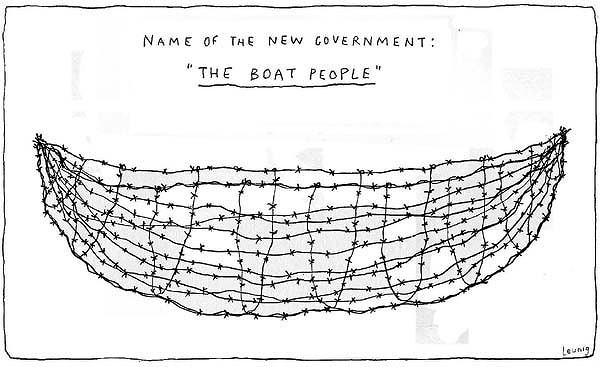Search
Democracy Links
Member's Off-site Blogs
keeping up appearances .....

When it comes to criticism, sometimes the harshest but most constructive feedback comes from friends.
This month, Australia's human rights record will be reviewed on the world stage under the United Nations' Universal Periodic Review process. This is a peer review in which, every four to five years, the human rights record of each of the 192 UN member countries is reviewed by the 191 other countries.
The rights of Aboriginal and Torres Strait Islander peoples will be the subject of significant international scrutiny. Aboriginal peoples in Australia remain among the most disadvantaged peoples in the world. For most Aboriginal peoples, there remain significant gaps in health, education, housing and employment standards and outcomes compared with non-Aboriginal Australians.
Among our close allies New Zealand, Canada and the United States, each of which has similar histories of colonisation, Australia is alone in not negotiating a treaty with its Aboriginal people and in failing to comprehensively entrench the right to equality in our national constitution or legislation. Is it any coincidence that the gap in social and economic indicators between indigenous and non-indigenous populations in Australia remains so much greater than in those countries?
Refugees and asylum seekers are a global issue and Australia's asylum seeker policy is likely to garner global interest. We are the world's 14th largest economy, yet provide shelter and refuge to only 0.03 per cent of the world's refugees and displaced persons. In 2009, Britain, Germany, Norway and Belgium were among 20 industrialised countries to receive more asylum seekers than Australia on a per capita basis. Yet, Australia alone compulsorily and indefinitely detains "unauthorised arrivals", including 1003 children, in remote detention centres. Just last week, the Australian of the Year, Professor Patrick McGorry, described our policy of mandatory immigration detention as "draconian" and "morally reprehensible", calling immigration detention centres "factories for mental illness". Australia can expect the same strong concerns to be expressed in the review process.
Another issue likely to attract international attention is our lack of a national human rights act, a deficiency which distinguishes Australia from every other liberal democracy in the world. This fact will not be lost on the likes of Canada, South Africa and New Zealand, all of which comprehensively protect human rights in law. Ironically, Australia has used the review to criticise small countries, such as the Marshall Islands, Micronesia and Kiribati, for failing to "ensure legal protection of human rights". Such hypocrisy has not gone unnoticed.
Testing our rights record with a little help from our friends
- By John Richardson at 17 Jan 2011 - 3:35pm
- John Richardson's blog
- Login or register to post comments
Recent comments
44 min 48 sec ago
4 hours 51 min ago
10 hours 7 min ago
10 hours 9 min ago
12 hours 19 min ago
12 hours 50 min ago
1 day 8 hours ago
1 day 10 hours ago
1 day 10 hours ago
1 day 11 hours ago